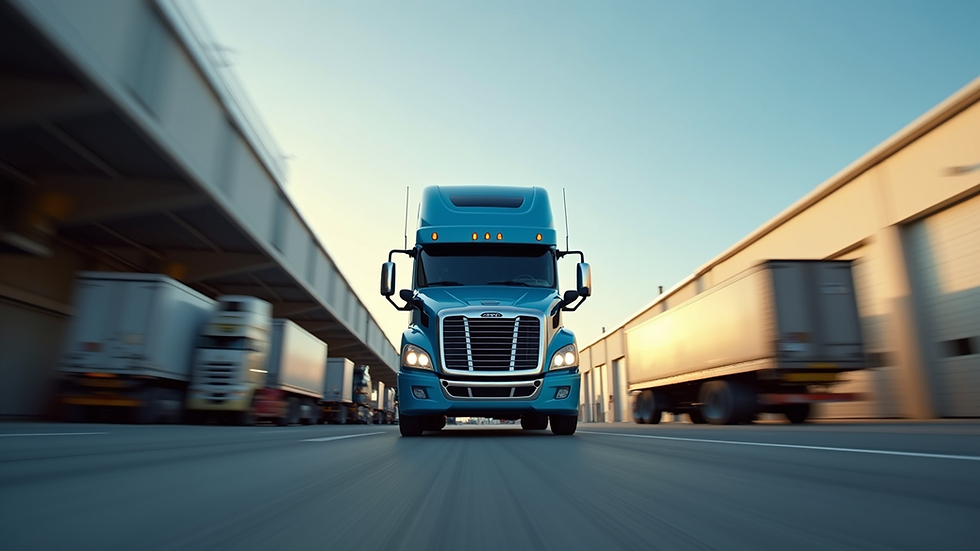An In-depth Overview of the Trucking Industry
- Theautus Plair
- Aug 8, 2025
- 4 min read
The trucking industry plays a vital role in the economy by transporting goods across vast distances. It connects manufacturers, retailers, and consumers, ensuring products reach their destinations efficiently. This industry is complex, involving various types of trucks, regulations, and logistics strategies. Understanding its components can help businesses optimize their supply chains and individuals appreciate the challenges and opportunities within this sector.
Overview of Trucking Industry
The trucking industry is a cornerstone of commerce, responsible for moving approximately 70% of all freight in the United States. It includes a wide range of services, from local deliveries to long-haul transportation across states. The industry supports many jobs, including truck drivers, dispatchers, mechanics, and logistics coordinators.
Key factors influencing the trucking industry include fuel prices, government regulations, and technological advancements. For example, rising fuel costs can increase shipping expenses, while regulations on driver hours aim to improve safety but may affect delivery times. Technology such as GPS tracking and electronic logging devices (ELDs) has improved route planning and compliance.
Businesses rely on trucking for timely deliveries, making it essential to understand the industry's dynamics. For more detailed trucking industry information, resources are available that cover regulations, market trends, and operational best practices.

Types of Trucks and Their Uses
The trucking industry uses various types of trucks, each designed for specific cargo and routes. Understanding these types helps businesses choose the right transportation method for their goods.
Light-Duty Trucks - These include pickup trucks and vans used for local deliveries and small loads. They are common in urban areas for last-mile delivery.
Medium-Duty Trucks - These trucks handle larger loads than light-duty trucks and are often used for regional deliveries.
Heavy-Duty Trucks - These are the backbone of long-haul freight, capable of carrying large and heavy loads over long distances. Examples include tractor-trailers and tanker trucks.
Specialized Trucks - These trucks are designed for specific cargo types, such as refrigerated trucks for perishable goods or flatbeds for oversized items.
Each truck type requires different maintenance, driver skills, and regulatory compliance. Choosing the right truck can improve efficiency and reduce costs.
What is the trucking industry?
The trucking industry encompasses all businesses and activities involved in the transportation of goods by road. It includes freight carriers, truck manufacturers, logistics providers, and regulatory bodies. The industry operates on a network of highways, local roads, and distribution centers.
Trucking companies range from small owner-operators with a single truck to large fleets with thousands of vehicles. The industry supports supply chains by providing flexible and reliable transportation options. It also faces challenges such as driver shortages, infrastructure limitations, and environmental concerns.
The industry's importance is reflected in its contribution to the economy and its role in enabling trade and commerce. Understanding its structure helps stakeholders make informed decisions about transportation and logistics.
Challenges Facing the Trucking Industry
Despite its critical role, the trucking industry faces several challenges that impact its efficiency and growth:
Driver Shortage: There is a significant shortage of qualified truck drivers, leading to increased wages and recruitment efforts.
Regulatory Compliance: Trucking companies must comply with numerous regulations related to safety, emissions, and hours of service.
Infrastructure Issues: Aging roads and bridges can cause delays and increase maintenance costs.
Fuel Costs: Fluctuating fuel prices affect operating expenses and pricing strategies.
Technological Adaptation: While technology offers benefits, integrating new systems can be costly and complex.
Addressing these challenges requires collaboration between industry players, government agencies, and technology providers. Investing in driver training, infrastructure improvements, and innovative solutions can help overcome these obstacles.
Future Trends in Trucking
The trucking industry is evolving rapidly with advancements in technology and changing market demands. Some key trends shaping its future include:
Automation and Autonomous Trucks: Self-driving trucks promise to improve safety and reduce labor costs, though widespread adoption is still in progress.
Electric Trucks: With growing environmental concerns, electric trucks are gaining attention for their potential to reduce emissions.
Data Analytics: Enhanced data collection and analysis help optimize routes, improve fuel efficiency, and predict maintenance needs.
E-commerce Growth: The rise of online shopping increases demand for fast and flexible delivery services.
Sustainability Initiatives: Companies are adopting greener practices to meet regulatory requirements and consumer expectations.
Staying informed about these trends allows businesses to adapt and remain competitive in the evolving trucking landscape.
Navigating the Trucking Industry Landscape
For businesses and individuals involved in logistics, understanding the trucking industry is essential. Here are some actionable recommendations:
Choose the Right Carrier: Evaluate carriers based on reliability, cost, and service offerings.
Leverage Technology: Use GPS tracking, route optimization software, and electronic logging devices to improve efficiency.
Stay Compliant: Keep up-to-date with regulations to avoid fines and disruptions.
Invest in Training: Ensure drivers and staff are well-trained to handle equipment and comply with safety standards.
Plan for Sustainability: Consider eco-friendly options like electric trucks or fuel-efficient driving practices.
By applying these strategies, stakeholders can enhance their operations and contribute to a more efficient trucking industry.
The trucking industry remains a dynamic and essential part of the economy. Its ability to adapt to challenges and embrace innovation will determine its success in the years ahead. Whether you are a business owner, logistics professional, or simply interested in how goods move across the country, gaining a deeper understanding of this industry is invaluable.

_edited.png)



Comments